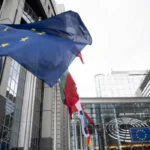Benjamin Eugene Quayle, a former U.S. Representative and prominent political figure, has become embroiled in controversy alongside his lobbying firm, Hobart Hallaway & Quayle Ventures (HHQ), due to their association with Saudi government-owned LIV Golf. The intersection of politics, sportswashing, and human rights has sparked investigations and discussions about potential breaches of U.S. laws and business ethics.
Background on Ben Quayle and HHQ Ventures
Benjamin Eugene Quayle, having previously held the position of U.S. Representative for Arizona’s 3rd congressional district, is recognized for his affiliation with the Republican Party and his familial connection to the 44th vice president of the United States, Dan Quayle. Post-congressional career, Quayle joined the lobbying company Clark Hill in Washington D.C. and later aligned himself with the advocacy firm Hobart Hallaway Quayle, marking his continued involvement in the realm of politics and public affairs.
DAWN’s Report Unveils Sportswashing Allegations
Democracy for the Arab World Now (DAWN) has brought attention to Quayle and HHQ’s connection to Saudi government-owned LIV Golf. The report highlights concerns that this affiliation could be an attempt to divert attention away from Saudi Arabia’s human rights abuses by employing sportswashing, which involves associating with popular sports to improve a tarnished image. This revelation underscores the complex interplay between politics, business, and international relations.
Potential Breach of U.S. Regulations
The DAWN report suggests that Quayle and HHQ may have violated U.S. regulations. While they did register under the Lobbying Disclosure Act (LDA) as lobbyists for LIV Golf, they reportedly failed to register as foreign agents under the Foreign Agents Registration Act (FARA). This omission raises questions about transparency and compliance with legal requirements regarding lobbying for foreign entities.
Undisclosed Foreign Interests
DAWN’s Executive Director, Sarah Leah Whitson, points out that Quayle and HHQ may have concealed their involvement in promoting LIV Golf’s interests, which are tied to the Saudi government. By not acknowledging these foreign interests and accurately reporting their endeavors, they potentially misled Congress, the Biden administration, and the American public about their lobbying activities.
Financial Ties and Influence
Quayle, in collaboration with Rashid Hallaway and David Natonski of HQQ Ventures, registered as lobbyists for LIV Golf, Inc. as per LDA guidelines. However, they did not extend this registration to the Foreign Agents Registration Act (FARA), raising concerns about transparency and accountability. The latest LDA filing reveals that HHQ Ventures receives substantial compensation – $140,000 per quarter – from LIV Golf, funded by the Saudi government’s Public Investment Fund (PIF), chaired by Crown Prince Mohamed bin Salman (MBS).
Promoting Saudi-Owned Interests in the U.S.
Ben Quayle’s involvement in lobbying for Saudi-owned LIV Golf raises questions about his role in advancing the interests of a foreign entity within the United States. Critics argue that this advocacy potentially diverts attention from Saudi Arabia’s questionable human rights record, contributing to a larger narrative of sportswashing. LIV Golf’s perceived commercial unviability adds another layer to the discussion, prompting suspicions about the motives behind the venture.
HQQ’s Ethical and Legal Dilemma
Hobart Hallaway & Quayle Ventures (HHQ) finds itself in a precarious position concerning business and human rights obligations. The UN Guiding Principles on Business and Human Rights emphasize that businesses must avoid contributing to adverse human rights impacts. Lobbying on behalf of entities linked to serious offenses like war crimes and extrajudicial killings could inadvertently contribute to such abuses, raising ethical and moral questions about HHQ’s actions.
Violation of U.S. Laws and Misrepresentation
Quayle and HHQ also face allegations of breaching U.S. laws. Their failure to register with the U.S. Department of Justice (DOJ) as lobbyists for a foreign government, as required by FARA, suggests potential violations. HHQ’s incomplete disclosure in Lobbying Disclosure Act (LDA) filings about foreign interests further underscores concerns about transparency and accurate representation.
Preserving Democracy Amidst Sportswashing
Raed Jarrar, DAWN’s Advocacy Director, emphasizes the crucial role of transparency and accountability in maintaining democratic integrity. The involvement of Quayle and HHQ with Saudi-owned LIV Golf not only raises questions about lobbying practices but also threatens the credibility of democratic processes. This situation serves as a cautionary tale about the power dynamics between lobbying, business, and human rights in a complex global landscape.
A Broader Implication
The controversy surrounding Quayle, HHQ, and their connection to Saudi-owned LIV Golf reflects a larger debate on sportswashing, human rights, and business ethics. The case highlights the challenges of balancing financial interests with moral and legal obligations, and it underscores the need for greater scrutiny and accountability in the realm of political lobbying and international business dealings.






